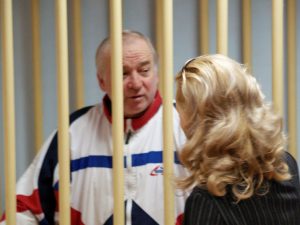
By Estelle Shirbon
LONDON (Reuters) – Britain will methodically work out who carried out a nerve agent attack on a Russian ex-spy and his daughter, then take robust action, interior minister Amber Rudd said on Thursday.
Former double agent Sergei Skripal, 66, and his daughter Yulia, 33, have been in hospital since they were found unconscious on Sunday on a bench outside a shopping center in the southern English city of Salisbury.
“Both remain unconscious, and in a critical but stable condition,” Home Secretary Rudd told parliament.

Sergei Skripal, a former colonel of Russia’s GRU military intelligence service, looks on inside the defendants’ cage as he attends a hearing at the Moscow military district court, Russia. Kommersant/Yuri Senatorov via REUTERS
British media and some politicians have speculated that the Russian state could be behind the attack – suggestions dismissed by Moscow as knee-jerk, anti-Russian propaganda.
“The use of a nerve agent on UK soil is a brazen and reckless act. This was attempted murder in the most cruel and public way,” Rudd said.
“But if we are to be rigorous in this investigation, we must avoid speculation and allow the police to carry on their investigation.”
Despite her call, several lawmakers pointed the finger at Russia during their questions to Rudd, with some calling for investigations to be re-opened into the deaths of Russian exiles in Britain in recent years.
Rudd rebuffed them, urging people to keep a cool head and saying the focus should remain on the Salisbury incident.
“We will respond in a robust and appropriate manner once we ascertain who was responsible,” she said. “We are committed to do all we can to bring the perpetrators to justice, whoever they are and wherever they may be.”
DOUBLE AGENT
Police said on Wednesday that a nerve agent was used against Skripal and Yulia. A British police officer who was also harmed by the substance was now able to talk to people although he remained in a serious condition, Rudd said.
Scientific tests by government experts have identified the specific nerve agent used, which will help identify the source, but authorities have refused to disclose the details.
Skripal betrayed dozens of Russian agents to British intelligence before his arrest by Russian authorities in 2004. He was sentenced to 13 years in prison in 2006, and in 2010 was given refuge in Britain after being exchanged for Russian spies.
The attack on him has been likened in Britain to the assassination of ex-KGB agent Alexander Litvinenko, a critic of Russian President Vladimir Putin, who died in London in 2006 after drinking green tea laced with radioactive polonium-210.
A British public inquiry later said Litvinenko’s murder had probably been approved by Putin and carried out by two Russians, Dmitry Kovtun and Andrei Lugovoy, an ex-KGB bodyguard who later became a member of parliament.
Both men denied any responsibility and Russia has refused to extradite them to stand trial.
Rudd was pressed during a BBC radio interview earlier on whether Britain had been too soft on Russia following the Litvinenko murder, sending out a message that such acts could be carried out with impunity.
She denied this and hinted that if Russia turned out to be implicated in the attack on Skripal, action would be taken against it.
“We are absolutely robust about any crimes committed on these streets in the UK. There is nothing soft about the UK’s response to any sort of state activity in this country,” she said.
(Additional reporting by Sarah Young, Alistair Smout and Michael Holden; Editing by Stephen Addison)